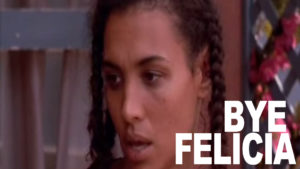Word from the web: ‘bye Felicia’ can be socially transformative

The phrase “Bye Felicia” originated from a scene in the film “Friday” (1995) in which Craig and Smokey dismiss a woman named Felisha who asks to borrow Smokey’s car. From that moment on, “bye Felicia” became the ideal phrase to dismiss people who lack social decency or are simply annoying. Although this film is almost as old as most students at SCAD, this phrase has had staying power, more so than other ‘90s slang like “scrub” and “bugaboo.”
While the phrase has not completely slipped away over the years, “bye Felicia” had a moment of re-emergence at the beginning of the year when Phylicia Rashad weighed in on the Bill Cosby controversy. Many people spoke out against Rashad, using the hashtag #byephylicia to indicate that her comments were not welcomed in an ongoing conversation about rape culture and victim-blaming. In a single stroke, a phrase from a comedy with weed jokes and toilet humor became interwoven into a larger dialogue about sexual assault and society’s failure to create an environment where sexually assaulted victims feel safe enough to tell their story.
While it probably will not have another moment like this, “bye Felicia” has the ability to show how unwelcome opinions that detract from the issue at hand are in public discourse. This term has the ability to make people pause for a second and reconsider the vitriol in their language. Moments after the vehement response on Twitter, Rashad attempted to clarify her statement by saying she did not want to derail the conversation about rape culture happening on the web.
“Bye Felicia” has aged well and remains a part of internet vernacular nearly two decades after the release of the film that brought it to prominence. There will be a time when another film will introduce an iconic phrase that will overtake “bye Felicia,” but for now, it stays with more significance than it had in its humble beginnings.























